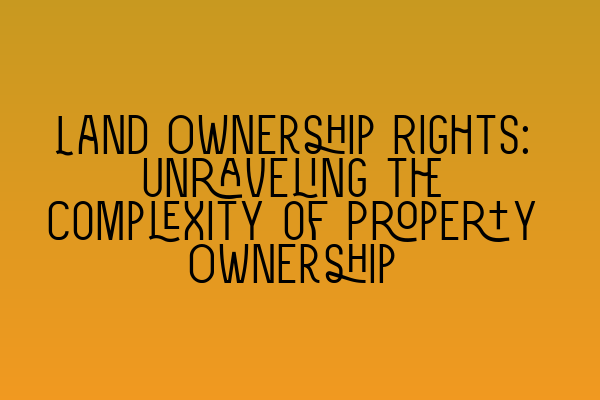Land Ownership Rights: Unraveling the Complexity of Property Ownership
When it comes to land ownership rights, the legal landscape can often be complex and confusing. Understanding the intricacies of property ownership is essential for both individuals and businesses alike. Whether you’re a homeowner, a real estate investor, or a landlord, having a solid grasp of land ownership rights can help protect your interests and ensure a smooth and successful property transaction.
At SQE Property Law & Land Law, we recognize the importance of being well-informed about land ownership rights. In this blog post, we will delve into the topic and help unravel the complexity surrounding property ownership. So, let’s dive in!
1. Freehold vs. Leasehold: Know the Difference
One of the fundamental distinctions in land ownership is between freehold and leasehold properties. Freehold ownership grants the owner absolute ownership rights over the property, meaning they have full control and can enjoy the property for an unlimited period.
On the other hand, leasehold ownership typically applies to properties with a specified lease term, commonly found in apartments and communal buildings. Leasehold owners have the right to occupy the property for the duration of the lease, but the ultimate ownership remains with the freeholder. Understanding the differences between these two types of ownership is crucial to make informed decisions related to buying or leasing property.
2. Land Registry: Registering Your Legal Rights
In the United Kingdom, the Land Registry plays a pivotal role in maintaining a record of land ownership rights. Registering your property with the Land Registry provides an official record of your ownership and offers protection against potential fraud or disputes. It is a legal requirement for most properties to be registered, ensuring transparency and clarity for both buyers and sellers.
3. Easements: Sharing Property Rights
In some instances, land ownership rights may involve easements. Easements grant someone else the right to use or access a portion of your property, such as a right of way or the installation of utility lines. Understanding easements is essential, as they can impact the value and usage of your property. If you are unsure about easements on a property you own or are interested in purchasing, it is advisable to seek legal advice to fully comprehend your rights and liabilities.
4. Restrictive Covenants: Limitations and Obligations
Restrictive covenants are another aspect of land ownership rights that often arise in property transactions. These covenants impose limitations and obligations on landowners, dictating how the property can be used or developed. Common examples include restrictions on building height, appearance, or use. It is crucial to be aware of any restrictive covenants that may affect your property, as they can impact your plans and potential future buyers.
5. Adverse Possession: Understanding Boundaries
Adverse possession is a legal concept that allows someone who has occupied a property without the owner’s permission for an extended period to claim ownership. Understanding the rules and requirements surrounding adverse possession is essential to protect your property rights. If you are in doubt about the boundaries of your property or suspect adverse possession, it is advisable to seek legal advice to avoid potential disputes.
Conclusion
Navigating the complex world of land ownership rights can be daunting, but awareness and understanding are key. Whether it’s knowing the difference between freehold and leasehold properties, registering your property with the Land Registry, understanding easements and restrictive covenants, or protecting against adverse possession, having a solid grasp of property ownership rights is crucial for any property owner.
At SQE Property Law & Land Law, we are committed to helping individuals and businesses navigate the intricacies of land ownership rights. If you have any questions or need legal assistance regarding property ownership, don’t hesitate to contact us. We have a team of expert property solicitors who can provide you with professional guidance and support.
Related Articles:
– SQE 1 Practice Exam Questions
– SQE 1 Practice Mocks FLK1 FLK2
– SQE 2 Preparation Courses
– SQE 1 Preparation Courses
– SRA SQE Exam Dates
Remember, being well-informed about land ownership rights is the first step towards making sound property decisions and protecting your interests. Stay empowered and make the most out of your property ownership journey!
